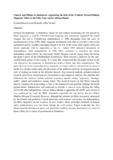Please use this identifier to cite or link to this item:
https://cris.library.msu.ac.zw//handle/11408/3499| Title: | Church and politics in Zimbabwe: appraising the role of the Catholic owned political magazine ‘Moto’in the fifty years under African hands | Authors: | Mapuwei, Nyasha Nwafor, Kenneth Adibe |
Keywords: | Church Catholics Media Peace and justice Independence, development |
Issue Date: | 2015 | Publisher: | Ebonyi State University Journal of Mass Communication | Series/Report no.: | Ebonyi State University Journal of Mass Communication;Vol. 2, No. 1: p. 216-229 | Abstract: | Political developments in Zimbabwe cannot be told without mentioning the role played by Moto magazine, a Catholic Church-owned magazine that immensely supported the armed struggle that led to Zimbabwean independence in 1980. Beginning from the years of nationalism in the late 1950s, Moto magazine deliberately took sides to provide a voice to the nationalists and its visibility and impact began to be felt by the racist white regime led by Ian Smith especially with its opposition to the in - famed 1965 unilateral declaration of independence. After independence in 1980, Moto continued to scrutinize the newly independent leaders led by the charismatic Robert Mugabe with its impact being felt during the paper’s probe of the Matabeleland disturbances. Moto became a platform for the anti-establishment groups of the society. It is from this background that the paper looked at the role played by the magazine in Zimbabwean politics before and after independence. The paper focused on the ownership of the magazine, its target audience, the political situation in all the five decades under study, the discourses of the political stories in the magazine and the style of writing on stories in the different decades. Key research methods included archival research, interviews, textual analysis, hermeneutics and diagnostic analysis. Key theories that influenced the research include political economy, agenda setting, hegemony, ideology, public sphere and mediation among others. The research found out that Moto magazine played a leading role in providing a voice to the nationalists and guerillas fighting the Smith regime before independence and continued to provide a voice to those fighting the ruling ZANU-PF after independence such as Joshua Nkomo’s opposition PF-ZAPU party beforeit was swallowed and later the MDC formations especially the one led by the now Prime Minister Morgan Tsvangirai. However, although the colonial era Moto was purely sponsored by the Church and guided by Church principles such as peace and justice, the independence era Moto magazine set out to please its new funders whose principles bordered on human rights and democracy just like those driving the civil society. Target readership has also blurred and the definition to peace and justice has suddenly become obscured in the voices of those calling for a change of government in Zimbabwe. | URI: | http://hdl.handle.net/11408/3499 | ISSN: | 2449-0369 |
| Appears in Collections: | Research Papers |
Files in This Item:
| File | Description | Size | Format | |
|---|---|---|---|---|
| Church and Politics in Zimbabwe.pdf | Abstract | 191.27 kB | Adobe PDF |  View/Open |
Page view(s)
202
checked on Feb 27, 2026
Download(s)
56
checked on Feb 27, 2026
Google ScholarTM
Check
Items in MSUIR are protected by copyright, with all rights reserved, unless otherwise indicated.



